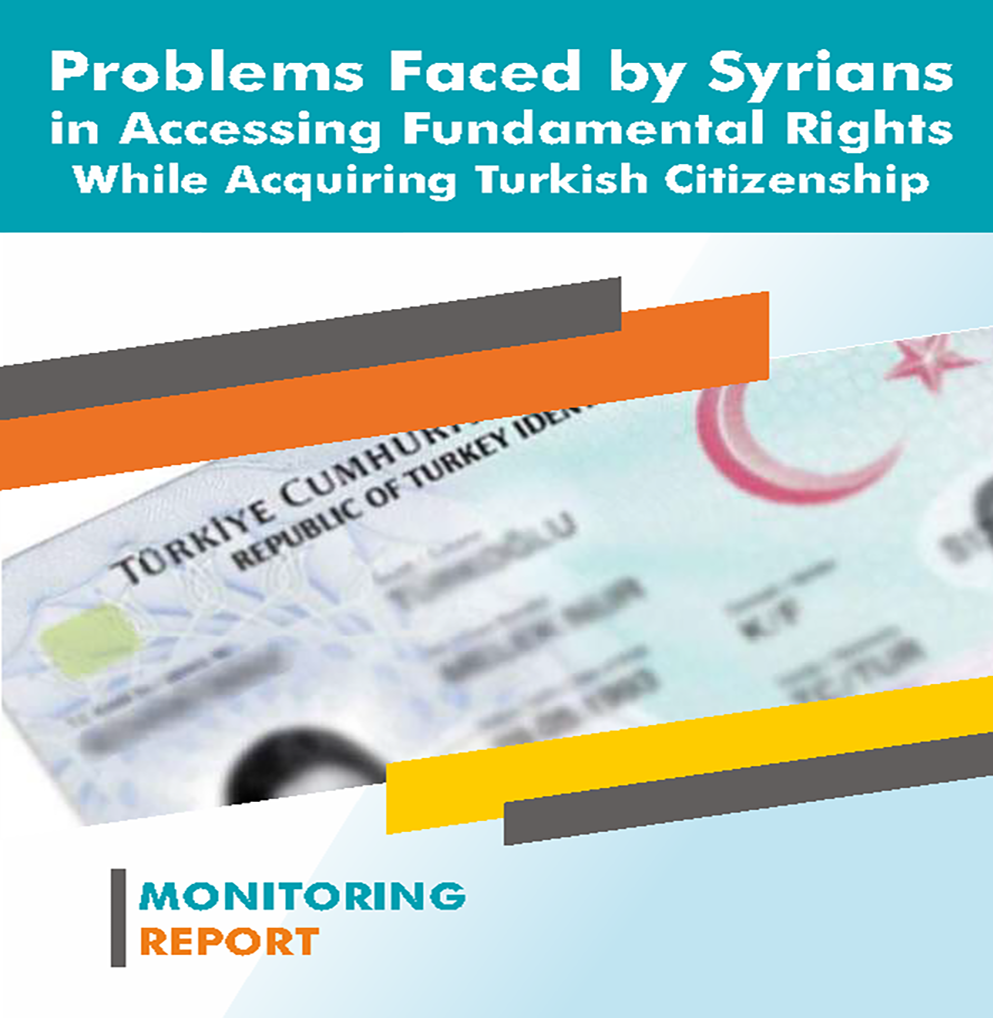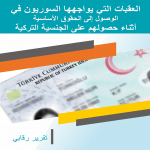Problems Faced by Syrians in Accessing Fundamental Rights While Acquiring Turkish Citizenship
December 2020
SOLARIS (Social Leadership, Research and Investigation Strategies) is a non-governmental organization established by professionals in many areas to implement projects which lead to social development and to create strategic solutions by conducting research and studies in fields such as women, education, entrepreneurship, sustainable development, environment, culture and arts, agriculture, food, migration and humanitarian. We can consider this study as the first phase of series of reports pursuant to the mission of SOLARIS.
The statement of Republic of Turkey President Recep Tayyip Erdoğan regarding granting citizenship to Syrian refugees in July 2016 has stayed on the agenda for a long time. Discussions, criticism, supportive opinions, and hate speeches against Syrian refugees started to be seen intensively in both mainstream media and social media, and the subject is still topical.
According to information given in the “Weekend Special” show on the Turkish TV channel CNNTurk by the Republic of Turkey Minister of Interior Süleyman Soylu on 29.12.2019, the number of Syrians who have acquired Turkish citizenship is 110.000 as of December 2019. 53 thousand of these people are adults and 57 thousand are children [1]. According to the information given by the Minister of Interior in the aforementioned program, the number of Syrians born in Turkey is over 450,000 [2].
As of the issue date of our report, these numbers have certainly increased. As the Minister of Interior expressed, by granting citizenship to these displaced people, the State of Republic of Turkey did not leave them in uncertainty and showed its humanitarian reflex. The State of Republic of Turkey gave them an opportunity to establish a better life in a way that is befit with human dignity and to look to the future with hope both for themselves and their children. Most of the people who were given citizenship did not experience any problems in accessing basic services in accordance with the ideal of social state. However, there are also people who could not access these rights due to various reasons. Our study is transformed into a report in order to eliminate the problems of these victims in accessing their fundamental rights, to provide their procedure processes like other refugees who benefit from the right of citizenship being executed without any problem, and to raise public awareness on this issue.
It is known that various reports were published on this issue at different times, but there has been no studies conducted on the problems faced by Syrian families while acquiring citizenship. For this reason, this study was carried out in order to solve the problems faced during the process of acquiring Turkish citizenship by Syrian refugees because of the fact that the parents acquired citizenship but the children born during citizenship investigation phase have not yet acquired or could not acquire citizenship. As SOLARIS, the primary objective of deciding to carry out this study is to be the voice of refugees, refugees and immigrants in Turkey and throughout the world when they face violation and victimization arising from not being able to access the rights that regulated in the laws, directly or indirectly, and regulations and/or bureaucratic reasons, to advocate for monitoring and granting rights, and to draw attention to the execution of necessary legal and administrative acts in the context of human rights.
Even though we tried to reach as many people as possible in our study, so many people that felt desperate and faced the same victimization of rights chose not to participate in our survey because no response could be obtained and victimization could not be remedied for a long time. For this reason, even though the sample size is larger, the individuals participating in our study also represent them. Our report has been prepared based on the information that is provided by 49 family members among the families experiencing similar situations in different provinces of Turkey through a survey interview carried out between August 1st -30th, 2020.
After analyzing and evaluating the survey data and interviews, it has been determined that almost all of the families faced the same problems in accessing fundamental rights such as healthcare, education and freedom of travel. It has been determined that the families who obtained the right to apply to the citizenship thanks to the exceptional article specified in the Turkish Citizenship Law complained about the long process of acquiring citizenship for their children and the uncertainty of what problems they would face in the future.
The main findings of the report are given below:
- 49 Syrian refugees living in 12 different provinces participated in the research.
- While 16 of the participants stated that they had been living in Turkey for more than 7 years, 33 of the participants stated they had been living in Turkey more than 4 years.
- Only 5 of the participants stated that only one of the parents acquired Turkish citizenship.
- 45 of the participants stated that only 1 child did not acquire Turkish citizenship. Other 4 participants stated that their 2 children did not acquire Turkish citizenship.
- 47 of the participants stated that the child who did not acquire citizenship was born in Turkey whereas only 2 stated that their children was born outside the borders of Turkey.
- While 40 of the children who did not acquire Turkish citizenship have Temporary Protection status, it has been determined that 7 of them are stateless, 1 is unregistered and 1 has visitor-guest status.
- Among the 49 participants who participated in the study, 43 of them stated that their freedom of travel were restricted, and 35 of them stated that they had difficulty in accessing to healthcare services. The number of those who stated that they could not get their children vaccinated is 21. While the number of those who stated that they had difficulties in accessing educational services is 32, it was observed that the difficulties encountered in education posed an indirect problem. In addition, the number of those who stated that they could not receive the newborn child support from the state is 19.
In the light of these findings, the following recommendations were briefly presented to the institutions involved in decision-making mechanisms to eliminate the problems of these victims in accessing the fundamental rights and carrying out procedure processes like other refugees who benefit from the citizenship rights without any problems.
- As of the publication of report, to put an end to these victimizations by making legislative regulations with decision-making mechanisms to eliminate such victimization completely with the support of the TBMM (Turkish Grand National Assembly) Higher Committee on Human Rights , TBMM (Turkish Grand National Assembly) Sub-Committee on Migration and Integration, relevant public institutions, departments of political parties responsible on human rights and migration, non-governmental organizations and institutions,
- In cases where both parents or one of the parents have acquired citizenship and only their children could not acquire Turkish citizenship due to bureaucratic reasons, to make the necessary legislative changes to carry out necessary administrative investigation processes as quickly as possible,
- To compensate the victimization of children whose parents have acquired citizenship but who could not acquire citizenship themselves due to long periods and different reasons, to take necessary steps to create a system similar to temporary citizenship number so that they can benefit from the rights arising from Turkish citizenship just like any Turkish citizen child,
- To convince the necessary institutions to respond quickly to issues that create irreversible victimizations such as vaccines, access to education, healthcare and social services so that these individuals whose parents have acquired Turkish citizenship but who have not yet acquired themselves access these services.
- To take steps to save children whose parents or one of the parents acquired citizenship and who was born in Turkey actually so that could not acquire Syrian citizenship and accordingly became stateless, but not even in this status legally, and to provide psychosocial support to both parents and children in order to prevent the traumas that these children and their families will experience in the future,
- To provide guidance, information sharing, awareness-raising support for the citizenship rights of parents who have acquired Turkish citizenship and the children who could not acquire citizenship through the state institutions and non-governmental organizations and institutions.


